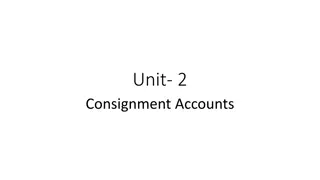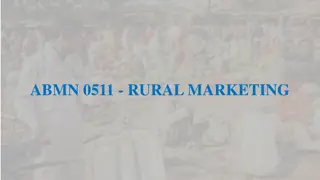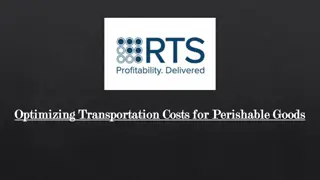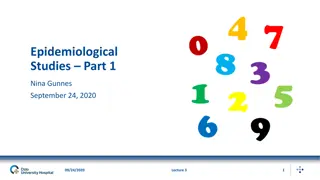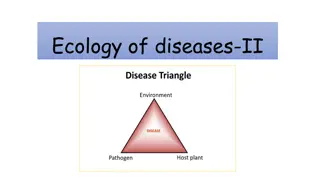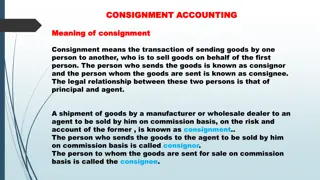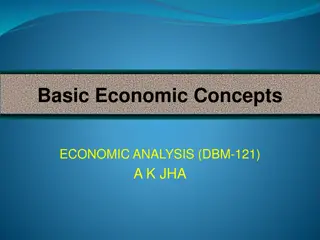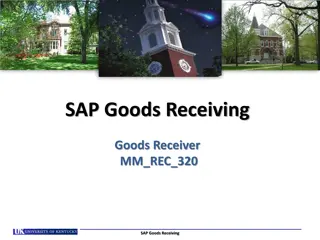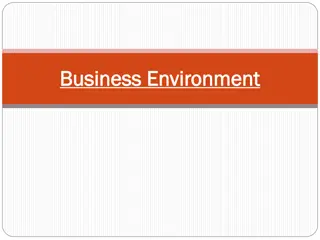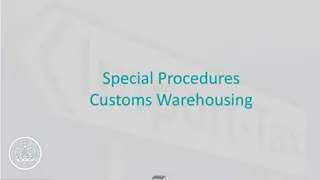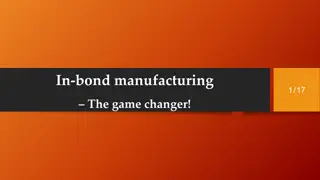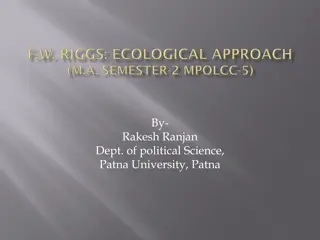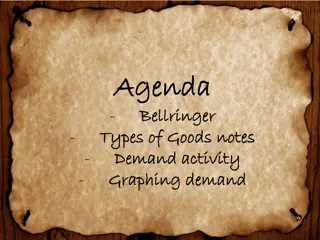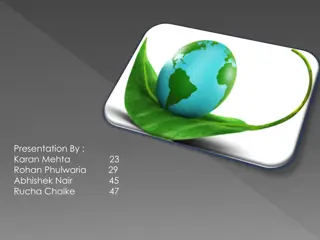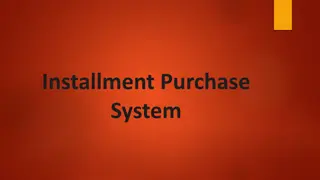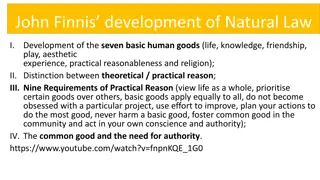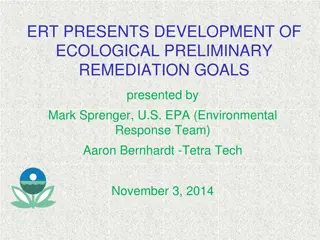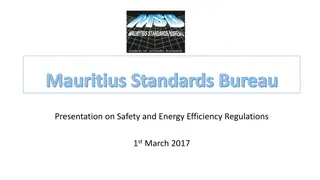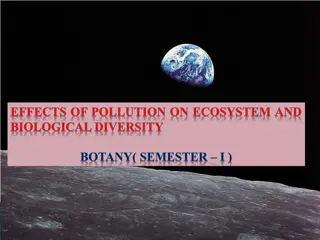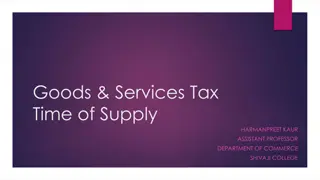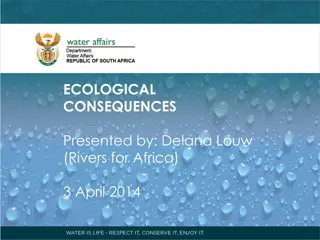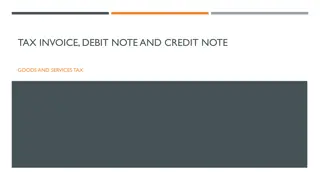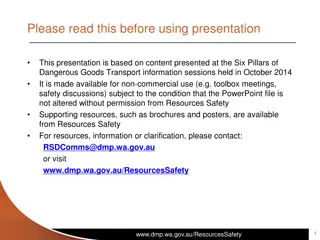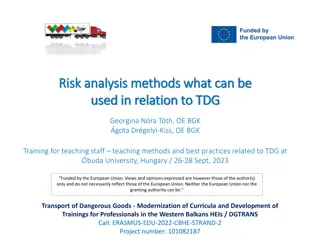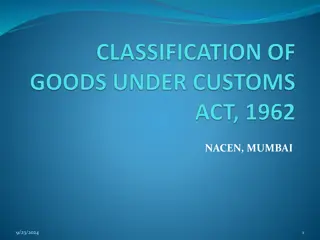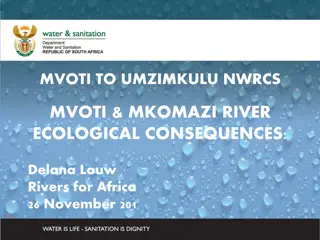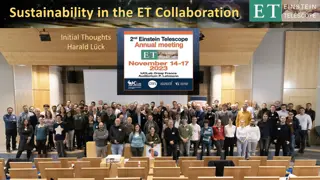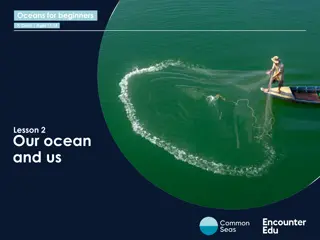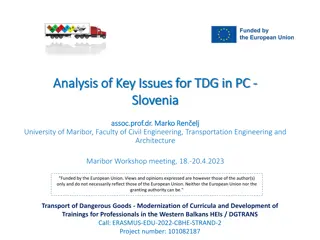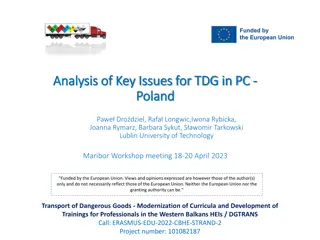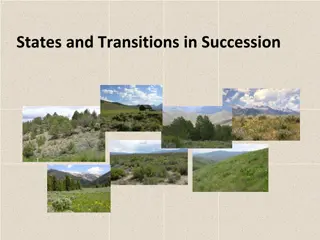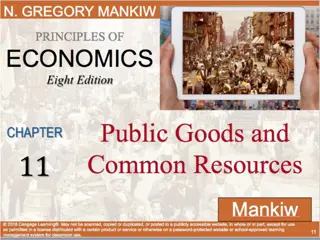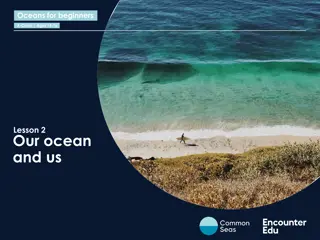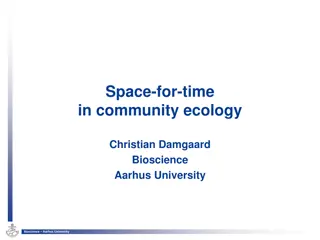Understanding Consignment Accounts in Business
Consignment accounts involve the sending of goods by a consignor to a consignee for sale on the consignor's behalf. The consignor remains the owner of the goods until they are sold, and the consignee sells the goods, collects money from customers, and receives commissions. Various types of commissio
9 views • 22 slides
Factors Influencing Economic Growth: Human Capital and Capital Goods
Factors such as investment in human capital, capital goods, natural resources, and entrepreneurship play a crucial role in determining a country's economic growth. Human capital encompasses the skills and abilities of workers, while capital goods are the tools and equipment used to produce goods and
2 views • 28 slides
ABMN 0511 - RURAL MARKETING
Rural marketing in India involves the flow of goods and services from producers to rural consumers, encompassing demand estimation, product planning, distribution, and ensuring consumer satisfaction. Key components of rural markets include the presence of goods for transactions, buyers and sellers,
1 views • 15 slides
Optimizing Transportation Costs for Perishable Goods
In the realm of logistics, the transportation of perishable goods presents a unique challenge. From fresh produce to pharmaceuticals, these time-sensitive commodities require specialized handling and efficient transportation to maintain their quality and integrity. One of the critical aspects of man
2 views • 6 slides
Overview of Ecological Studies in Epidemiology
Ecological studies in epidemiology involve studying groups of individuals at a population level to examine the correlation between exposure and disease occurrence. While cost-effective and useful for generating hypotheses, ecological studies have limitations, such as the inability to control for con
3 views • 21 slides
Understanding Ecosystems and Disease Ecology
Explore the diverse types of ecosystems, including autochthonous, anthropurgic, and synanthropic ecosystems, and their impact on disease ecology. Learn about biotopes, biocenosis, ecological mosaics, and ecological interfaces, and discover how infectious diseases can be transmitted across these inte
0 views • 10 slides
Understanding Consignment in Accounting
Consignment in accounting involves sending goods from a consignor to a consignee for sale on commission basis. The consignor retains ownership until the goods are sold. The relationship is that of principal and agent, with the consignee handling sales and remitting net proceeds. Important terms incl
1 views • 7 slides
Mastering Desktop Receiving in PeopleSoft eProcurement
Explore the functionality of desktop receiving in the PeopleSoft eProcurement module to efficiently manage goods receipt processes in your department. Learn how to receive, review, sort, and reject ePro goods, along with creating desktop receipts for Office Depot Purchase Orders. Understand the step
0 views • 14 slides
Understanding Basic Economic Concepts: Needs, Wants, Goods, and Services
Exploring fundamental economic concepts such as needs versus wants, goods, services, and products. Learn about the differences between goods and services, types of goods related to income, types of goods related to price, and types of goods related to consumption ability.
0 views • 11 slides
SAP Goods Receiving Training Overview
SAP Goods Receiving training covers the process of confirming receipt of goods or services within a department. It includes roles, training requirements, process flow, transaction codes, and various functionalities related to Goods Receiving in SAP. The training targets individuals authorized to rec
1 views • 52 slides
Understanding Business Environment and Objectives
Business encompasses a wide range of activities related to the production and distribution of goods and services, influenced by various interpretations from consumers, governments, and environmentalists. It involves activities like buying, selling, manufacturing, and service provision, all aimed at
0 views • 61 slides
Understanding Customs Warehousing and Simplified Customs Declaration Procedures
Customs Warehousing is a special procedure that allows goods to be stored in the UK while customs duties and import VAT are suspended. It aims to facilitate trade by providing duty suspension for businesses importing goods from other countries. Additionally, the Simplified Customs Declaration Proced
1 views • 23 slides
In-Bond Manufacturing: A Game Changer in Customs Regulations
In-bond manufacturing allows for certain operations to be carried out on warehoused goods without payment of customs duties, benefiting businesses by facilitating cash flow and ease of doing business. The process involves obtaining permission, following specific regulations, and potentially exportin
1 views • 17 slides
The Ecological Approach in Comparative Public Administration
Fred W. Riggs, a proponent of the Ecological Approach in Public Administration, emphasized the importance of understanding the interaction between administrative systems and their external surroundings. He introduced the Fused-Prismatic-Diffracted Model to explore the unique contexts of developing c
0 views • 21 slides
Brexit VAT Treatment of Goods and Services Overview
The Brexit VAT treatment of goods and services impacts cross-border supplies to the UK, VAT refunds for goods, separation provisions under the Withdrawal Agreement, and the Ireland/Northern Ireland Protocol. Changes in VAT regulations and protocols are outlined for businesses and traders within the
3 views • 10 slides
Understanding Types of Goods and Demand in Economics
Explore the concepts of normal versus inferior goods, the law of demand, and graphing demand curves in economics. Learn how income changes affect consumer behavior with examples of goods and services. Understand how to identify normal and inferior goods based on consumer preferences and income level
0 views • 11 slides
Understanding the Relationship Between Ecology and Business
Ecology and business have a complex relationship where human activities impact the ecological environment, and in turn, the environment influences our quality of life. Maintaining ecological balance is crucial for sustainable development, and businesses play a significant role in ensuring environmen
0 views • 19 slides
Understanding the Installment Purchase System
The installment purchase system is similar to credit and hire purchase systems, allowing buyers to make payments in installments over a period of time. The buyer gets possession and ownership of the goods immediately, but if there's a default in payment, the vendor can't repossess the goods. Instead
0 views • 4 slides
John Finnis' Development of Natural Law and Basic Human Goods
John Finnis' theory of natural law focuses on the development of seven basic human goods, including life, knowledge, friendship, play, aesthetic experience, practical reasonableness, and religion. He emphasizes the distinction between theoretical and practical reason, outlines nine requirements of p
0 views • 14 slides
Eco-Remediation Goals Development Training Overview
This presentation by Mark Sprenger from the U.S. EPA discusses the development of Ecological Preliminary Remediation Goals (PRGs). It covers the process steps, assumptions, risk information activities, and resources related to ecological risk assessment within the EPA's programs. The training module
0 views • 53 slides
Understanding the Theory of Demand in Microeconomics
The theory of demand in microeconomics explores the concept of consumer willingness and ability to purchase goods and services at various prices. Factors influencing demand include price, related commodity prices, income levels, consumer preferences, population size, and distribution of income. The
1 views • 13 slides
Safety and Energy Efficiency Regulations Overview by Mauritius Standards Bureau
Explore the comprehensive overview of safety and energy efficiency regulations presented by the Mauritius Standards Bureau on 1st March 2017. The presentation covers important topics such as the Consumer Protection Act, Controlled Goods, Energy Efficiency Act, verification of Certificates of Conform
0 views • 15 slides
Understanding Biological Diversity and Ecological Organization
Exploring the intricate balance of flora and fauna on our planet, this content delves into the vast array of plant and animal species coexisting in various ecosystems. It discusses the significance of biodiversity, the interaction of biotic and abiotic components in ecological systems, and the ecolo
0 views • 41 slides
Understanding Public Goods in Higher Education
This text delves into the concept of public goods in higher education, examining the distinctions between public and private forms, the economic and political dimensions, and the normative value of public goods. It discusses the economic definition of public goods, emphasizing their non-rivalrous an
1 views • 18 slides
Understanding Goods and Services Tax (GST) Time of Supply
Goods and Services Tax (GST) time of supply, also known as TOS, determines when GST becomes payable on a supply. This includes various elements like agreement to supply, delivery of goods, provision of services, invoice issuance, payment, and recording of payments. The time of supply for goods and s
0 views • 26 slides
Understanding Ecological Consequences in Ecosystem Management
Delana Louw from Rivers for Africa presented on the ecological consequences of various scenarios in ecosystem management. The process involves delineating units of analysis, stakeholder engagement, quantifying ecological water requirements, evaluating scenarios, and determining management classes. B
0 views • 14 slides
Understanding Tax Invoices, Debit Notes, and Credit Notes in Goods and Services Tax
This content covers the basic concepts of supply, invoicing obligations, tax invoices under Section 28, removal of goods for supply, and scenarios where removal does not result in a supply. Learn about the different types of taxes and when tax invoices should be issued for taxable goods and services
0 views • 28 slides
Understanding Segregation of Dangerous Goods in Transport
This presentation provides valuable information on the segregation of dangerous goods for transport, based on the Six Pillars of Dangerous Goods Transport. It covers topics such as what dangerous goods to segregate, how to segregate them, and includes practical examples. Important examples of incomp
0 views • 12 slides
Risk Analysis Methods Related to Transport of Dangerous Goods at Buda University, Hungary
Explore risk analysis methods in relation to Transport of Dangerous Goods (TDG) at Buda University, Hungary. Discover best practices for teaching staff through funded training programs aimed at modernizing curricula and developing professionals in the Western Balkans. Learn about European recommenda
0 views • 30 slides
Guidelines for Harmonized System Classification of Goods
Understand the step-by-step process of classifying goods under the Harmonized System, including referencing section notes and chapter notes, resolving ambiguities in word meanings, identifying essential characteristics of unfinished goods, choosing specific headings over general ones, and classifyin
0 views • 41 slides
Ecological Consequences Assessment for Conservation Areas
Determining the ecological consequences of various scenarios is crucial for conservation efforts. The assessment focuses on changes in geomorphology, physico-chemical properties, fish populations, macroinvertebrates, and riparian vegetation. By evaluating scenarios based on ecological significance,
0 views • 11 slides
Sustainability Challenges in ET Collaboration: Addressing Ecological and Non-Ecological Aspects
The ET Collaboration is realizing the importance of sustainability, encompassing ecological and non-ecological aspects. Issues include balancing energy consumption and hardware longevity, remote access possibilities, funding sustainability, social partnerships, and designing instruments with sustain
0 views • 5 slides
Challenges and Trends in the Sporting Goods Industry
The sporting goods industry has faced challenges such as store closures, bankruptcies, and shifting consumer preferences. Sales in sporting goods stores remained relatively stable from 2015 to 2016, but a significant decrease was seen in the first seven months of 2017. Participation in physical acti
0 views • 10 slides
Exploring Ecological Goods and Services in Our Oceans
Delve into the fascinating world of ecological goods and services provided by our oceans. Discover the tangible products and intangible benefits humans derive from marine ecosystems, including provisioning services like food and raw materials, regulating services such as climate regulation and coast
0 views • 14 slides
Analysis of Key Issues for Transport of Dangerous Goods in Slovenia
This analysis focuses on the legal bases and regulations governing the transportation and inspection of dangerous goods in Slovenia, covering aspects such as international agreements, EU requirements, specific legislation for different modes of transportation, and the Dangerous Goods Transport Act.
0 views • 11 slides
Modernization of Transport of Dangerous Goods in Poland
Analysis of key issues related to the transport of dangerous goods (TDG) in Poland, focusing on tools, methods, standards, and programs involved in the TDG chain, including the relevant legislation such as the Act on the Carriage of Dangerous Goods and the ADR Agreement. The ADR covers general provi
0 views • 11 slides
Understanding Plant Community Succession and Ecological Transitions
Explore the dynamic process of plant community succession, from pioneer stages to climax communities, and the intricate patterns of transitions in ecological systems. Discover the variability and stability of different states within ecosystems, highlighting the complexities of natural ecological dyn
0 views • 14 slides
Understanding Public Goods and Common Resources
Exploring concepts like private goods, public goods, common resources, free rider problem, Tragedy of the Commons, and cost-benefit analysis in economics, this content helps differentiate between types of goods and resources, providing insights into the challenges and considerations associated with
0 views • 15 slides
Understanding Ecological Goods and Services from Our Oceans
Explore the importance of ecological goods and services provided by oceans in Lesson 2 of the Oceans for Beginners curriculum. Learn about the tangible products, benefits, and services derived from ocean ecosystems, and reflect on their significance. Understand the categories of ecological services
0 views • 15 slides
Understanding Space-for-Time Substitution in Community Ecology
Space-for-time substitution (SFT) is a method used to study slow ecological processes by assuming different sites are at various stages of development. This approach, famous for its role in ecological development, has been critiqued for its implicit use in testing hypotheses on ecological processes
0 views • 7 slides
